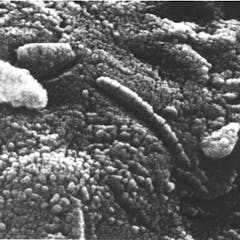
Articles on Fossils
Displaying 161 - 180 of 386 articles

This is a hugely important find. It means that one of our earlier ancestors possibly originated in southern Africa.

While crocodylian fossil swim traces have been described from other continents, to the best of our knowledge the examples we describe are the first such reptilian swim traces from Africa.

The arrangement of bones in our specimen’s fins are the same as those of ‘fingers’ in tetrapods. The only difference is the digits are locked within the fin, and not free moving.

The findings suggest that this specimen could climb and move in trees. But it may also have been able to walk on the ground. This echoes previous studies.

The fossil includes the tiny creature’s original bone and flesh.

The skull of Oculudentavis, found encased in amber, provides new clues into the transition from dinosaurs to birds and may be smallest of either ever found.

Scientists claim to have found DNA in fossilised dinosaur cartilage.

The analysis suggests that there was a mass extinction event at the time of the end-Permian, on land - and that it happened at the same time as the marine end-Permian extinction.

Teeth can reveal a lot about diversity when they are reasonably well-preserved.

This fossil find provides strong evidence of an African origin for some Malagasy chameleon lineages.

These trackways offer rare insights about ancient life in a stressful, hostile environment during the Early Jurassic.

New research shows how rock features that look like fossilised microbes can form without life.

Understanding why the great auk went extinct could help protect species still living today.

Newly discovered extinct ape Danuvius has some human-like features, but that doesn’t mean it could walk like us.

The discovery of a perfectly preserved snake skull fossil answers many questions about the evolution of snakes from lizards.

How do we know that bees were around when dinosaurs still roamed the Earth? The main evidence comes from fossils – the mineralized remains of long-dead organisms.

Scientists claimed they knew what this bizarre creature was – our evidence suggests the question is still open.

The rise and fall of monkeys in ancient Europe should remind us of our own species’ precarious relationship with changing climates.

A ‘game-changing’ fossil pterosaur suggests these species could easily fly between continents, helping to explain why similar specimens have been found all over the world.

Paleontologists created an evolutionary map of how croc body size changed over the last 200 million years – with some interesting implications for today’s species.
